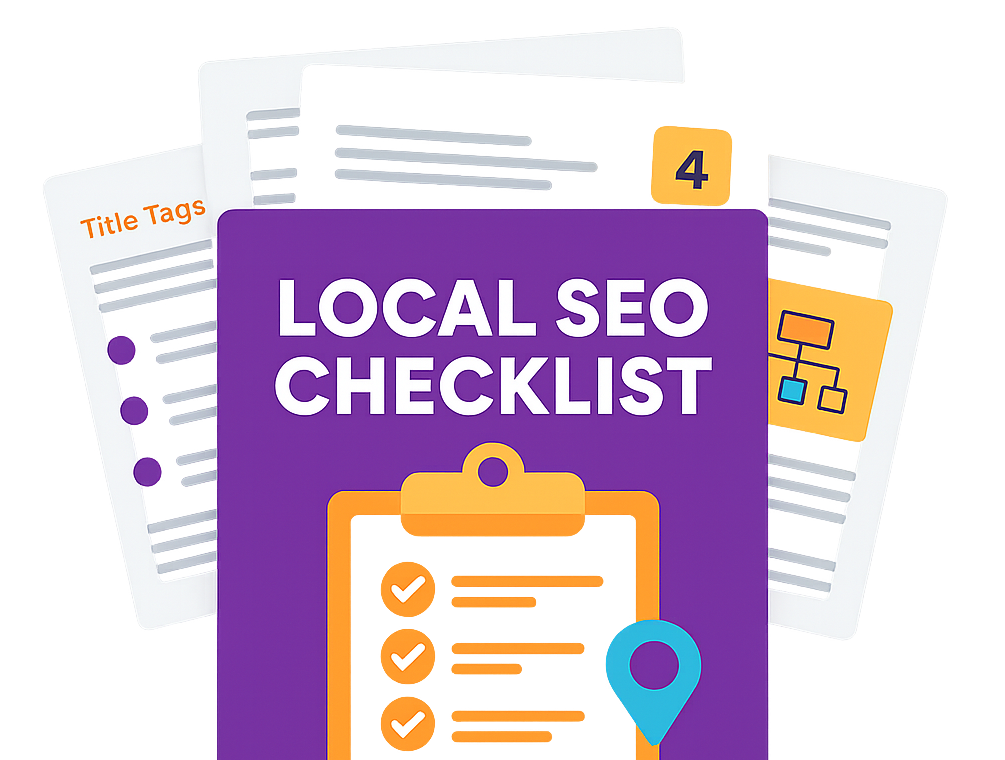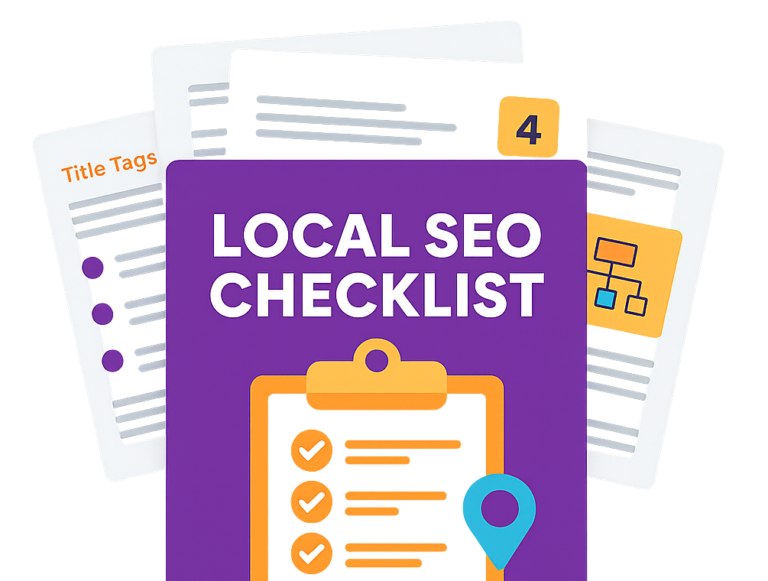Earning backlinks is all about building trust and authority. When another website links to you, they're essentially giving you a vote of confidence. Search engines like Google see these "votes" and use them as a major signal to decide how high to rank your site. The process boils down to creating genuinely useful content and then reaching out to other reputable sites to show them what you've made.
Why Backlinks Are So Important for UK Businesses
Before we get into the nuts and bolts of how to get backlinks, it's crucial to understand why they matter so much. In the UK's crowded digital space, just having great content on your site often isn't enough to get found. High-quality backlinks are the currency of trust online. They act as powerful endorsements that tell search engines your content is credible, valuable, and worth showing to people.
A solid backlink profile isn't just a "nice-to-have"; it's a fundamental part of modern SEO. Think of a link from a respected UK industry blog or a local news outlet. That single link carries serious weight, signalling to Google that your website is an authority. This directly impacts your ability to rank for the keywords that your customers are actually searching for.
The Foundation of Digital Authority
This idea of "authority" is central to how search engines see your website. When an established site links to you, it passes along some of its own authority—a concept known in SEO circles as 'link equity'. It's why one link from a major publication can do more for you than dozens of links from tiny, unknown blogs.
For small businesses trying to make a name for themselves, building this digital reputation is the key to sustainable growth online. If you're just getting started, getting a handle on the basics of affordable SEO services for small business can set you on the right path.
The data backs this up in a big way. One major study found that a jaw-dropping 91% of all web content gets zero organic traffic from Google. A huge reason for this is a lack of quality backlinks. The same research showed that pages ranking in the top three spots have, on average, 35% more backlinks than pages that rank lower.
To make this a bit clearer, let's look at the core principles of building a strong backlink profile.
Core Link Building Concepts at a Glance
A strategic backlink programme isn't just about collecting as many links as possible. It's a targeted effort focused on quality and relevance. The table below summarises the key ideas you need to grasp.
| Concept | Why It Matters for Your UK Business |
|---|---|
| Relevance | A link from a UK-based plumbing supplier is gold for a local plumber. It tells Google you're a legitimate player in that specific industry and location. |
| Authority | One link from a site like The Guardian or a major trade publication is far more powerful than 100 links from brand-new, low-quality blogs. |
| Link Equity | Think of it as "link juice". Authoritative sites pass more of this value to you, boosting your own site's credibility in Google's eyes. |
| Natural Profile | Your backlink profile should look natural. A sudden flood of 1,000 links overnight is a red flag. A steady, organic pace of acquisition is key. |
Understanding these concepts helps shift your mindset from simply "getting links" to strategically "earning endorsements" that will serve your business for years to come.
The Bottom Line: Backlinks aren't just a vanity metric for traffic. They are the bedrock of your website's authority, essential for improving your search rankings and establishing your brand as a trusted voice in your field.
And this isn't just for traditional websites. If you're creating other types of content, like a podcast, a strong backlink profile is just as vital for getting discovered. Digging into specialised resources on things like Podcast SEO can give you a better understanding of how to optimise different formats. At the end of the day, a smart, strategic approach to earning links is what separates a successful website from one that's lost in the digital static.
Building Your Link-Worthy Foundations
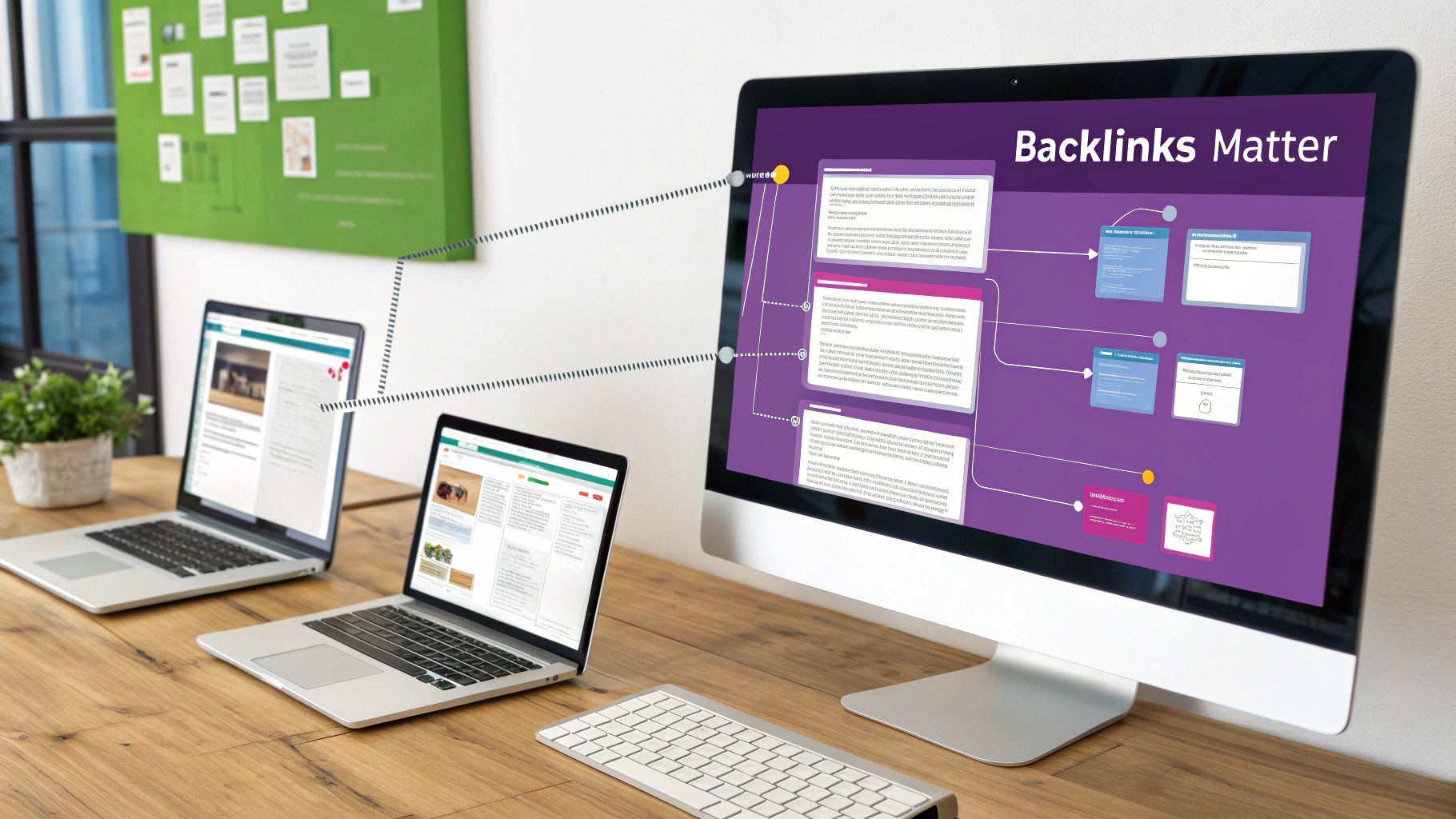
It’s a common mistake to think link building starts with firing off emails. The reality? Successful campaigns are built on something much more solid: creating content so genuinely useful that other people in your industry actually want to reference it.
Before you even dream of writing an outreach email, you need to build your linkable assets. These are the pieces of content on your website that will do all the heavy lifting. Without them, you’re just asking for a handout with nothing to offer in return, and your emails will be deleted on sight.
Think of it like this: you wouldn’t ask a stranger for a favour without offering something of value first. In the world of SEO, your linkable asset is your value proposition. It needs to be compelling enough to make a busy website editor stop, take notice, and see a clear benefit in linking to you.
What Makes an Asset Link-Worthy?
A linkable asset is a piece of content specifically designed to attract backlinks. Its main job isn’t to make a direct sale, but to provide so much value that other sites naturally want to cite it. This is how you build true authority in your niche.
Sure, these assets often take more time and effort to create than a typical blog post. But the payoff is enormous. The aim is to produce a "go-to" resource on a specific topic—something so good that it’s easier for others to link to you than to try and create their own version.
Here are a few proven types of linkable assets that work time and time again:
- Original Research & Data Studies: Nothing attracts links like fresh data. If you can conduct a survey or analyse some unique data, you’ve got gold. Journalists and bloggers are always on the lookout for new statistics to cite. For example, a Cambridge-based tech firm could survey local SMEs on their AI adoption rates and publish the findings.
- In-Depth "How-To" Guides: A truly comprehensive guide that walks someone through a tricky problem is an incredible asset. If you can create the definitive guide on a subject, others will gladly send their audience your way.
- Free Digital Tools & Templates: Think interactive calculators, downloadable checklists, or useful templates. These provide instant, hands-on value. A local accountancy firm, for instance, could create a free VAT calculator specifically for small UK businesses.
Analyse Competitors to Find Your Angle
Once you’ve got a few ideas bubbling away, it’s time for some detective work. You need to see what’s already earning links for your competitors. This isn’t about copying; it’s about smart gap analysis. By seeing who links to your rivals and why, you can spot opportunities they’ve completely missed.
Fire up an SEO tool and dig into the backlink profiles of the top-ranking pages for your target keywords. Start asking yourself these questions:
- What kinds of topics are clear link magnets in my industry?
- Which formats (guides, studies, tools) are getting all the attention?
- Is there a way I can create something far more comprehensive, more up-to-date, or just plain better-looking?
This approach, sometimes called the Skyscraper Technique, is all about finding what works and then building something that blows it out of the water. This gives you a powerful, built-in reason to get in touch with everyone already linking to that older, inferior resource.
By understanding what assets earn links for your competitors, you can reverse-engineer their success and create a resource that is objectively superior. This makes your outreach efforts far more effective.
Ultimately, getting this foundation right is the most critical part of the entire link-building process. With genuinely valuable assets in your arsenal, the rest of the campaign becomes a strategic exercise in promotion, not a desperate plea for links.
Focusing on Quality to Earn High-Impact Links
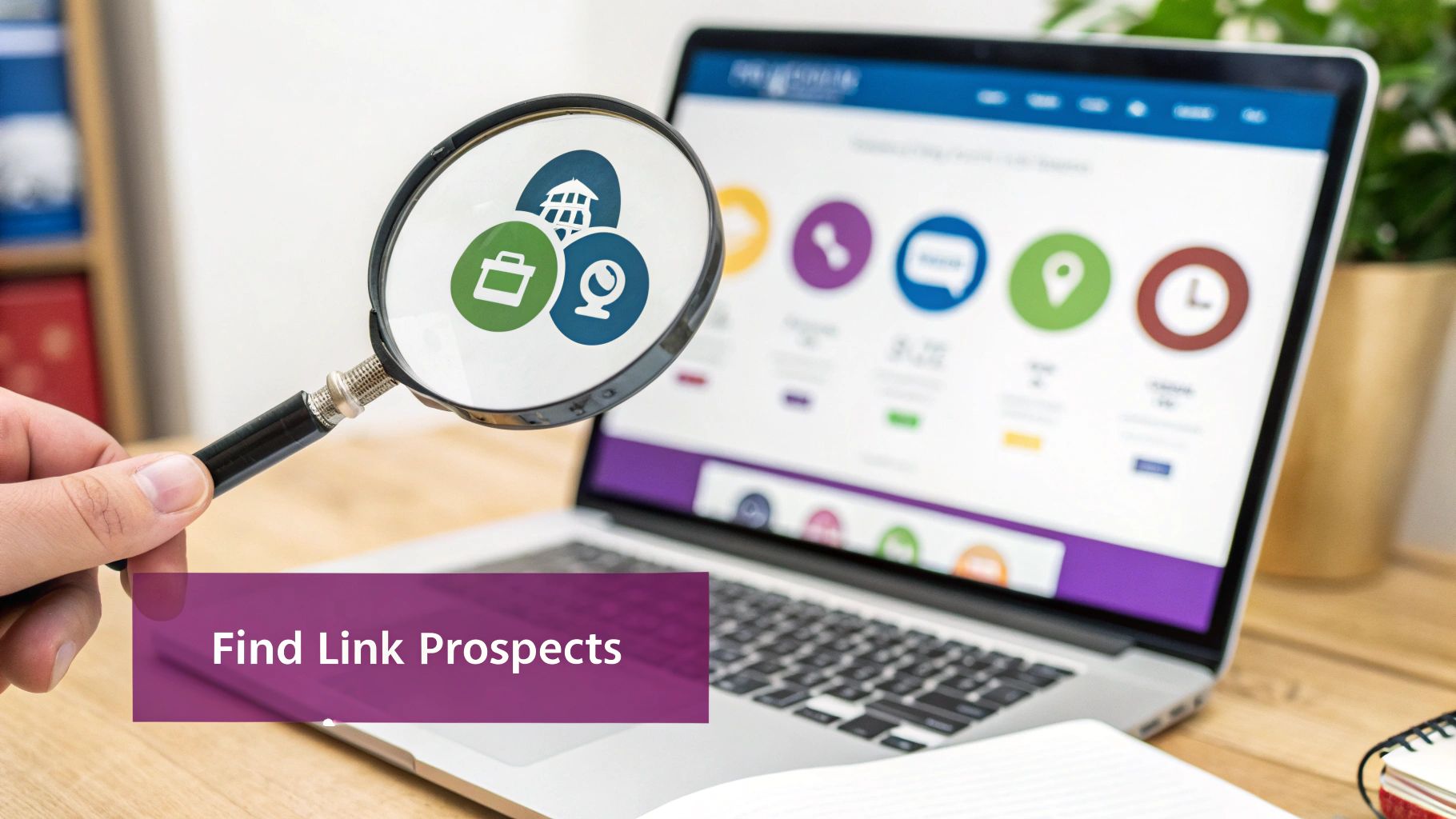
The days of just grabbing hundreds of low-value links are well and truly over. If you want to make any real headway with SEO today, your strategy has to be about quality, not quantity. Forget the numbers game; this is about earning genuine trust and authority.
What does that mean in practice? It means a single, powerful backlink from a respected UK industry blog is worth far more than a dozen links scattered across irrelevant, low-quality directories. Search engines have become incredibly sophisticated at understanding context, and they reward sites that get genuine endorsements from credible sources.
The Power of Relevance
Think of it this way. If you run a software company in Manchester, a backlink from a national tech publication or a major North West business journal sends a clear, powerful signal to Google. It tells the search engine exactly who you are and what you do. That combination of topical relevance (tech) and geographic relevance (Manchester, North West) is pure gold.
This principle has completely reshaped modern SEO. UK link building now prioritises high-authority sources like government sites and specialist blogs because they deliver a much bigger impact than a pile of unrelated links. You can read more about this shift toward quality-focused link building strategies at Heavyweight Digital.
Ultimately, this means being selective and strategic. You need to focus your resources where they’ll make a real difference to your rankings and your brand's digital footprint.
How to Evaluate a Potential Link Target
Not all websites are created equal. Before you pour time and effort into outreach, you absolutely must vet your potential targets. A quick check can save you from chasing links that offer zero value—or worse, could actually harm your site's reputation.
So, what should you look for? Here are a few key things I always check when sizing up a website:
- Topical Alignment: Is this website talking about the same things as you? A link from a site deep in your niche is always more powerful than one from a completely unrelated field.
- Audience Overlap: Does their audience look like your target customer? A good backlink isn't just for SEO; it should also be capable of sending relevant, interested people your way.
- Website Authority and Trust: Does the site look credible and well-cared-for? Look for signs of a real, active business, like a professional design, regular content updates, and a clear "About Us" page.
A high-quality backlink should feel like a natural recommendation from one trusted expert to another. If a link looks forced or out of place on a page, you can bet search engines will view it with the same suspicion.
By adopting this quality-first mindset, you stop just collecting links and start building a solid network of authoritative endorsements. This is the foundation of a sustainable backlink strategy that stands the test of time and drives real business growth.
Actionable Link Building Tactics for UK SMEs
Alright, with your foundation of link-worthy content in place, it’s time to roll up our sleeves and start actively earning those backlinks. This is where the rubber meets the road. For most UK SMEs, the real secret isn't some risky shortcut; it's about playing the long game with sustainable, ethical tactics that build genuine relationships and authority.
Let’s get past the generic advice and dig into the practical workflows that actually get results, even if you’re working with a tight budget. The aim here is to build links in a way that positions your brand as a credible, go-to voice within your specific UK niche.
Reclaim Lost Links with Broken Link Building
The web is always in flux. Sites get redesigned, pages move, and businesses rebrand. This digital churn constantly creates broken links pointing to pages that have simply vanished. For a savvy business, this is a golden opportunity.
The idea behind broken link building is simple: you find these dead links on relevant, authoritative websites in your industry and reach out to the site owner. You then offer your own fantastic content as a perfect replacement. It’s a genuine win-win. You help them fix a problem on their website, and in return, you get a valuable backlink.
Here’s a quick rundown of how you can get started:
- Pinpoint Your Competitors: Make a list of your direct and indirect competitors in the UK market.
- Analyse Their Backlinks: Use an SEO tool to hunt for pages on their sites that are now showing a 404 error but still have links pointing to them. These are your targets.
- Find a Solid Replacement: Dig through your own content to find a piece that’s a suitable—or even better—substitute for the dead resource. If you don't have one, you've just found a great idea for your next blog post.
- Reach Out and Help: Send a friendly, genuinely helpful email to the website owner. Let them know about the broken link you spotted and gently suggest your resource as the ideal fix.
This infographic breaks down the core process, reminding us that having great content ready is the fuel for any successful link-building campaign.
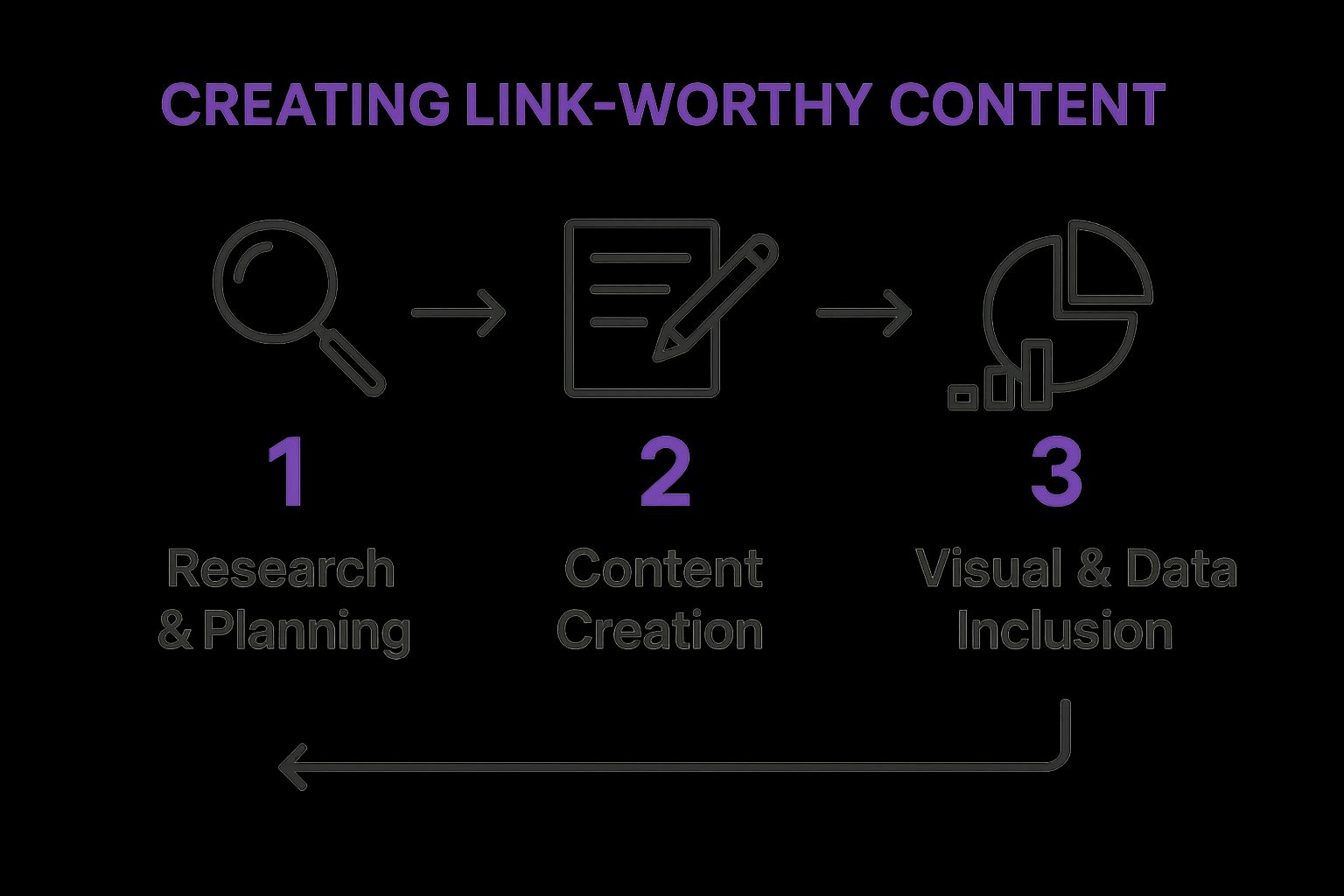
The main takeaway? Proactive, research-driven content creation is the engine that powers effective link-building tactics like this one.
Turn Unlinked Brand Mentions into Backlinks
If your business is making any waves online, people are probably already talking about you. They might mention your company name in a blog post, a news article, or a roundup of local businesses. But quite often, these mentions don't actually link back to your website.
These unlinked brand mentions are the definition of low-hanging fruit. The author already knows and values your brand enough to bring it up; all you need to do is give them a gentle nudge to add the link. The first step is to set up alerts to monitor mentions of your brand name across the web.
Pro Tip: When you get in touch, don't just demand a link. Always start by thanking them for the mention. Then, politely explain how adding a link to a specific, relevant page on your site would provide even more value for their readers. It's a subtle shift, but it makes your request feel collaborative rather than demanding.
Master the Art of Guest Posting
Guest posting has been a staple in SEO for a long time, but its purpose has shifted dramatically. Forget the days of churning out spammy, low-effort articles for any site that would take them. Today, strategic guest posting is all about placing your expert content on genuinely authoritative and relevant UK blogs. For instance, a guest post on a respected tech industry site is a fantastic way for a Cambridge startup to build authority. There are some brilliant https://www.bare-digital.com/seo-growth-hacks-for-cambridge-tech-startups-on-a-budget/ that tie directly into this localised approach.
Your goal here is twofold: earn a high-quality backlink and introduce your brand to a fresh, highly targeted audience. The trick is to pitch articles that are packed with value, where a mention of your brand or a link to your resources feels completely natural.
To make the outreach phase of your link building more efficient, learning how to use modern tools can give you a serious edge. For example, knowing how to extract phones, emails, and other contact info with AI can help you find the right person to contact much faster.
Using Digital PR to Secure Authority Backlinks

Sure, tactics like broken link building can get you results, but Digital PR is where the real magic happens. This is how you land the kind of top-tier, authority backlinks that most of your competitors can only dream of. It’s a total mindset shift—less about pure SEO and more about thinking like a public relations pro.
Instead of just begging for a link to your latest blog post, you’re creating genuinely newsworthy campaigns that journalists and high-authority publications actually want to talk about. You’re promoting a story, a unique piece of data, or an expert opinion from your business. This is the path to getting featured in national news, leading industry magazines, and other highly trusted online sources.
Think of it as creating a link-worthy asset, but on a much grander scale. Your goal is to become the source for compelling information in your niche.
Crafting a Newsworthy Campaign
The heart of any solid Digital PR effort is a killer idea. Let's be honest, journalists get bombarded with hundreds of pitches daily. Yours has to cut through the noise immediately. It needs to be timely, relevant to their audience, and ideally, backed by original data or a unique angle.
Here are a few proven ways to create content that gets noticed:
- Data-Led Reports: Run a survey on a hot topic in your industry, analyse public data to uncover a surprising trend, or poll your customers on their habits. Journalists absolutely love fresh stats to add weight to their articles.
- Reactive Commentary: Keep a close watch on the news cycle in your sector. When a big story breaks, be ready to offer your expert opinion or analysis. This quickly positions you as a thought leader and a go-to source for quotes.
- Creative Content Pieces: Think outside the box. Develop an interactive map, a clever calculator, or a fascinating visualisation that tells a compelling story. These assets are gold for attracting both links and social media buzz.
While some simpler link-building tactics are fairly low-cost, a proper Digital PR campaign requires a real investment in content and outreach. In fact, research shows it's common for UK professionals to put serious budget behind these high-impact activities. For instance, data from Energy PR reveals that 46.5% of SEOs in the UK set aside between £5,000 and £10,000 a month for their backlink campaigns.
By becoming the origin of a story, you move from being a supplicant asking for links to a valuable partner providing journalists with the content they need. This fundamentally changes the dynamic of your outreach.
The Value of Top-Tier Placements
Securing a link from a major publication does so much more than just pass on SEO authority; it builds incredible brand credibility. While directory submissions definitely have their place, particularly for local SEO, they just don't pack the same brand-building punch. If you are focusing on those foundational links, our ultimate guide to high-authority directory submissions is a great place to start.
But the prestige and referral traffic from a single Digital PR placement can be a game-changer. It’s a long-term play that builds your reputation, making every future link acquisition easier because your brand becomes more recognised.
Before you know it, you might find journalists coming to you for comments, cementing your status as a true industry leader.
Common Link Building Questions Answered
When you're getting started with link building, it’s completely normal to have a few questions pop up again and again. Getting clear, practical answers is the best way to shape your strategy and set goals you can actually hit. Let's dig into some of the most common queries we hear from businesses just like yours.
How Long Until I See Results?
This is a big one. In SEO, and especially with link building, patience truly is a virtue. You might notice some small, encouraging shifts in your rankings within a few weeks, but the real, measurable impact usually takes between 3 to 6 months to materialise.
Of course, this timeline isn't set in stone. It can change based on how competitive your industry is, the current authority of your website, and the quality of the backlinks you’re building. It's much healthier to think of link building as a long-term investment in your site's credibility, not a quick win.
Is It Safe to Buy Backlinks?
Let me be direct: no. Buying backlinks is a risky shortcut that flies directly in the face of Google's guidelines. Sure, it might give you a temporary, hollow boost, but you're gambling with some serious penalties. This could mean a manual action that gets your site wiped from search results altogether.
Your time and budget are far better spent earning links through great content, genuine outreach, and smart Digital PR. An authentic link, given freely by an editor, is worth so much more and builds a sustainable foundation for success.
Falling for this trap is one of the most common—and damaging—5 common SEO mistakes small businesses make. It's crucial to understand the risks and steer clear.
How Many Backlinks Do I Need?
If I had a pound for every time I've been asked this, I'd be retired by now. The truth is, there’s no magic number. The amount of backlinks you need to crack the first page is completely dictated by the competition for your target keywords.
Instead of obsessing over a number, shift your focus to quality and relevance. A much better strategy is to:
- Analyse your rivals: Take a good look at the backlink profiles of the sites already sitting in those top spots. What kind of links do they have?
- Aim for quality over quantity: Your real goal is to build a profile that matches, or even surpasses, the quality of theirs. This means earning links from authoritative and relevant websites.
The question of "how many backlinks do I need to rank" is a popular one, and looking at the data behind it can help you set more realistic and effective targets for your own campaign.


